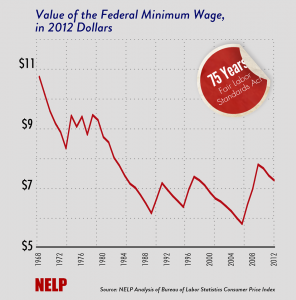 Growing discontent over rising U.S. economic inequality was evidenced by electoral races in 2013, and could also play a major role in the 2014 midterm elections, says a recent report by the polling firm Lake Research Partners. The issue is breeding new momentum for minimum wage increases across the country and sparking outrage at corporations like Wal-Mart that make record profits but fail to pay a living wage to many of their employees. “Too often lost in the Washington parlor games and politics of the hour is the overarching lesson we should draw from 2013: that a populist economic message about building the middle class and leveling the playing field-especially for those Americans who are working full-time yet still earning below the poverty level-is at the core of voters’ agenda,” researchers said. In November, New Jersey voters decided to raise the state’s minimum wage to $8.25 by January 1, 2014 and add annual cost-of-living increases. Pending a possible recount, voters in SeaTac, WA, passed a ballot initiative to raise the local minimum wage to $15 per hour and provide paid sick leave. Mayor-elects in New York, Boston and Pittsburgh all won elections with messages of lifting up the working class. A recent Hart Research Associates study finds that 80 percent of the public-including 62 percent of Republicans-supports a minimum wage increase. “In 2014, smart candidates will be addressing this theme with substantive policy solutions and connecting with voters in the same ways that produced such eye-catching results this November,” Lake Research said. On Black Friday, thousands protested, and some were arrested, at Wal-Mart locations around the country to call upon the mega-retailer with $17 billion in annual profits to pay its full-time employees a minimum of $25,000 a year and for the company to stop punishing workers who stand up for their rights. Fast-food workers are planning a one-day strike in 100 cities on Thursday, December 5 as part of a $15-an-hour wage campaign. In a joint op-ed for CNN, AFL-CIO President Richard Trumka and National Employment Law Project Executive Director Christine Owens called on Congress to pass legislation that would raise the minimum wage to $10.10 an hour. “An increase in the minimum wage-which hasn’t risen since 2009—is long overdue,” said the pair. “If the minimum wage had just kept pace with inflation since 1968, it would be $10.77 an hour today instead of $7.25. For tipped workers, the rate’s been stuck at a scandalous $2.13 for 20 years.” The Senate is expected to consider the “Fair Minimum Wage Act” this week.
Growing discontent over rising U.S. economic inequality was evidenced by electoral races in 2013, and could also play a major role in the 2014 midterm elections, says a recent report by the polling firm Lake Research Partners. The issue is breeding new momentum for minimum wage increases across the country and sparking outrage at corporations like Wal-Mart that make record profits but fail to pay a living wage to many of their employees. “Too often lost in the Washington parlor games and politics of the hour is the overarching lesson we should draw from 2013: that a populist economic message about building the middle class and leveling the playing field-especially for those Americans who are working full-time yet still earning below the poverty level-is at the core of voters’ agenda,” researchers said. In November, New Jersey voters decided to raise the state’s minimum wage to $8.25 by January 1, 2014 and add annual cost-of-living increases. Pending a possible recount, voters in SeaTac, WA, passed a ballot initiative to raise the local minimum wage to $15 per hour and provide paid sick leave. Mayor-elects in New York, Boston and Pittsburgh all won elections with messages of lifting up the working class. A recent Hart Research Associates study finds that 80 percent of the public-including 62 percent of Republicans-supports a minimum wage increase. “In 2014, smart candidates will be addressing this theme with substantive policy solutions and connecting with voters in the same ways that produced such eye-catching results this November,” Lake Research said. On Black Friday, thousands protested, and some were arrested, at Wal-Mart locations around the country to call upon the mega-retailer with $17 billion in annual profits to pay its full-time employees a minimum of $25,000 a year and for the company to stop punishing workers who stand up for their rights. Fast-food workers are planning a one-day strike in 100 cities on Thursday, December 5 as part of a $15-an-hour wage campaign. In a joint op-ed for CNN, AFL-CIO President Richard Trumka and National Employment Law Project Executive Director Christine Owens called on Congress to pass legislation that would raise the minimum wage to $10.10 an hour. “An increase in the minimum wage-which hasn’t risen since 2009—is long overdue,” said the pair. “If the minimum wage had just kept pace with inflation since 1968, it would be $10.77 an hour today instead of $7.25. For tipped workers, the rate’s been stuck at a scandalous $2.13 for 20 years.” The Senate is expected to consider the “Fair Minimum Wage Act” this week.
Read the original article on the GoIAM Website here.